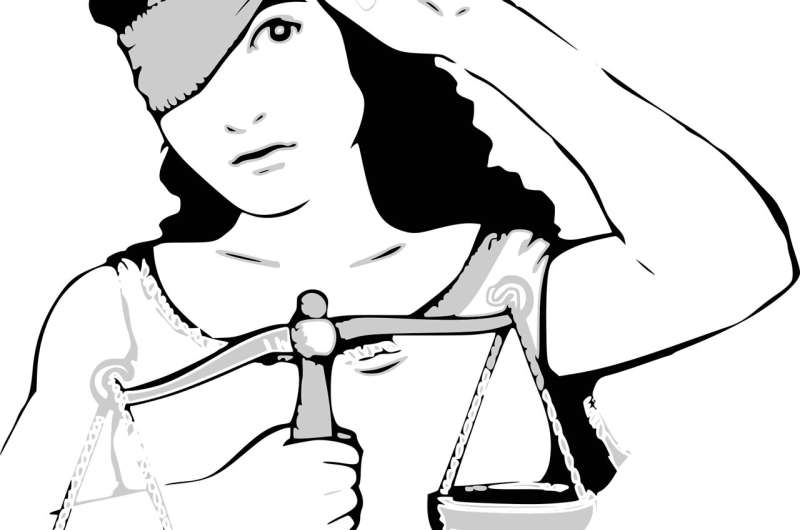This article has been reviewed according to Science X's editorial process and policies. Editors have highlighted the following attributes while ensuring the content's credibility:
fact-checked
peer-reviewed publication
trusted source
proofread
Mindfulness can enhance responses to witnessing injustice

To be mindful is to be fully present, aware of where we are and what we are doing, and not be overly reactive or overwhelmed by the things that are happening around us.
Because of this, a concern about the practice of mindfulness is it could numb people to injustice—which indicates the possibility of a negative side effect of mindfulness.
Intrigued by this possibility, as part of an international team of co-authors based in Australia, Greece, and Singapore, Professor of Organizational Behavior & Human Resources Jochen Reb decided to embark on a comprehensive research project to shed light on the issue.
Speaking to the Office of Research, he explains, "Most people perceive mindfulness as leading to greater self-awareness and self-regulation. This is why the practice of mindfulness has been used to reduce stress and enhance well-being following the widespread success of Jon Kabat-Zinn's Mindfulness-Based Stress Reduction program."
He adds, "As mindfulness can reduce the reactions and negative feelings of being stressed or overwhelmed, it is quite possible that it can also temper negative emotions in the face of injustice. Since not much research has been conducted in this area, we wanted to be one of the first researchers in the world to examine this issue."
He continues, "The other reason for embarking on this research was to increase our understanding of self-transcendence, which is another outcome of mindfulness practice. Self-transcendence means going beyond a narrow egocentric perspective on the world, feeling empathy and displaying behaviors for helping other people including third parties whom one might or might not know. These behaviors are characterized by a concern for the rights, feelings, and welfare of other people."
The research
The research project was centered on the question, "Does mindfulness numb or enliven people's response to third party injustice, such as observing another person being unfairly mistreated or framed for a mistake that they did not make?"
To answer the question, Professor Reb and his three collaborators designed a robust research project comprising four separate studies covering multiple countries, contexts, and research designs. The research project took over three years to complete and is now available in the journal Organizational Behavior and Human Decision Processes.
The thinking behind conducting a total of four studies was to uncover evidence on whether mindfulness can lead more conclusively to concern for others who are being treated unfairly.
In this research project, Professor Reb collaborated with Adam A. Kay, Senior Lecturer at the University of Queensland Business School; Theodore Masters-Waage, Post-Doctoral Research Associate at INSEAD; and Pavlos A. Vlachos, Associate Professor ALBA Graduate Business School, The American College of Greece.
The research design
The first two studies were field studies whereas the latter two studies were experiments conducted in the laboratory.
Study 1 was centered on measuring the daily state of mindfulness in supervisor responses to observing justice violations by their subordinates. This study was conducted in the UK. The sample size consisted of 147 supervisors with an average age of 38 years.
Study 2 examined how mindfulness affected consumer reactions to perceived corporate social irresponsibility. 435 people participated in this study and the average age of the participants was 35 years.
Study 3 was an in-person laboratory experiment with a modified ultimatum game. It was conducted in Singapore to ascertain if mindfulness would heighten concern for others, especially in cases of moderate unfairness. The sample included 477 undergraduate students with an average age of 21 years.
Finally, Study 4 was an online experiment that examined responses of people witnessing third-party injustice after a mindfulness intervention. A total of 773 people in the UK with an average age of 29 years participated in the study.
Insights from the research
Contrary to the dissenting view that mindfulness numbs people to injustice, the four studies showed that mindfulness enhances the moral outrage experienced when seeing others being treated unfairly, and subsequently, the punishment of the perpetrator of the injustice or mistreatment.
No bystanding behavior, i.e., the greater the number of people present, the less likely people will help a person in distress, was observed in all four studies.
This effect was successfully replicated across the studies among the different participants from the different countries who were subjected to the different contexts and research designs.
More information: Adam A. Kay et al, Mindfully outraged: Mindfulness increases deontic retribution for third-party injustice, Organizational Behavior and Human Decision Processes (2023). DOI: 10.1016/j.obhdp.2023.104249


















